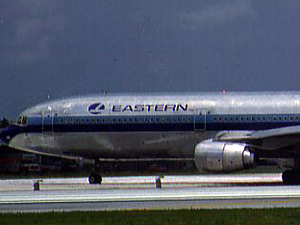|
Audio
Photos
|
August 2, 2005
If Northwest Airlines mechanics go on strike August 19th, it will be the first airline mechanics strike in the U.S. since 1992. That strike at USAir (now US Airways) lasted only five days. But a 1989 mechanics strike at Eastern Airlines set off a two-year chain of events that ended with the airline's demise. We talk with workers who lived through two strikes with very different outcomes.
St. Paul, Minn. — Ted Burzynski's advice to Northwest mechanics today would be quite different from what he might have said 15 years ago. At that time, Burzynski was a mechanic for Eastern Airlines in New York, walking the picket line and thinking -- as he puts it -- "that'll fix 'em." Looking back, he says a strike didn't fix anything.
"Now this is coming from me: I walked the line five weeks short of two years: the bottom line is, nobody won out. It was a losing battle all the way around," Burzynski says.
In 1989, mechanics at Eastern took on their boss, Frank Lorenzo, whom Congress would later ban from ever managing an airline again. Workers were convinced Lorenzo was out to break the unions and dismantle Eastern, which fueled a "scorched earth" mentality among labor.
Burzynski says a strike was unlikely to fix anything, but at least there was the satisfaction of taking action.
Patrick Kinane, who was an Eastern Airlines mechanic in Chicago, says workers knew deep down it was suicide. "We knew it wasn't going to be a strike, with renegotiation and then we'd go back," Kinane says. "We were striking, and this was the end of our jobs."
Similarly, mechanics at Northwest have said they're aware a strike may cost them their jobs. Northwest has spent more than $20 million training replacement mechanics and wants to outsource more work to third-party maintenance shops. Without the union around, the airline could try to make its temporary contingency plan permanent.
At Eastern, the impact of the strike was crippling. Burzynski says this was mostly due to pilots, flight attendants, and ground workers who refused to cross the mechanics' picket lines.
"I still remember looking through the terminal windows, looking at the screens -- 'cancelled, cancelled, cancelled, cancelled' -- one after another, day after day, 'cancelled, cancelled,'" Burzynski says. "The pilots were really the ones that downed it. They put the icing on the cake."
At Northwest, it looks unlikely pilots would honor mechanics picket lines. Ground workers and flight attendants have sent mixed signals. Northwest says it is prepared to replace both mechanics and flight attendants if needed.
In 1989, Eastern did have a contingency plan to replace mechanics, though the absence of pilots rendered it somewhat moot. In the case of the five-day mechanics strike at USAir in 1992, it was easier to tell the impact of the airline's contingency plan -- or rather, its lack of one.
The local mechanics union chairman in Pittsburgh -- then and now -- is Bill Freiberger. Mechanics did not have help from other unions. But Freiberger says when the strike hit, USAir's public promises to keep flying fell flat.
"It tried to operate, but it was a very reduced flight schedule," Freiberger says. "And to be honest with you, the strike really hurt them economically, because the average citizen wasn't going to go out and buy a ticket on an airline that they thought was going to go on strike and then when it did, the bookings just went away."
As in the current situation at Northwest, USAir mechanics were fighting to keep certain jobs from going outside the union. The strike ended when mechanics took a small pay cut and the airline allowed those jobs to remain. Though the USAir strike was short, Freiberger says the disruptions shook the confidence of ticket-buyers for some time.
Northwest says flights will not miss a beat in the case of a strike. Mechanics union officials counter that travelers should be ready for delays. The outcome of a strike could hinge on who is right. However things play out, former Eastern mechanic Ted Burzynski says mechanics should be prepared for the helplessness that can come from being on strike.
"Once you're on the outside, there's nothing to do," Burzynski says. "You can make your point evident by carrying signs and yelling, and TV reporters and radio interviews -- I went through it all. Sooner or later, the news gets old."
Still Burzynski, who now works at a charter airline on Long Island, says sometimes "you do what you have to do." In a way, at Northwest, the arguments from both the mechanics and the airline boil down to that.




